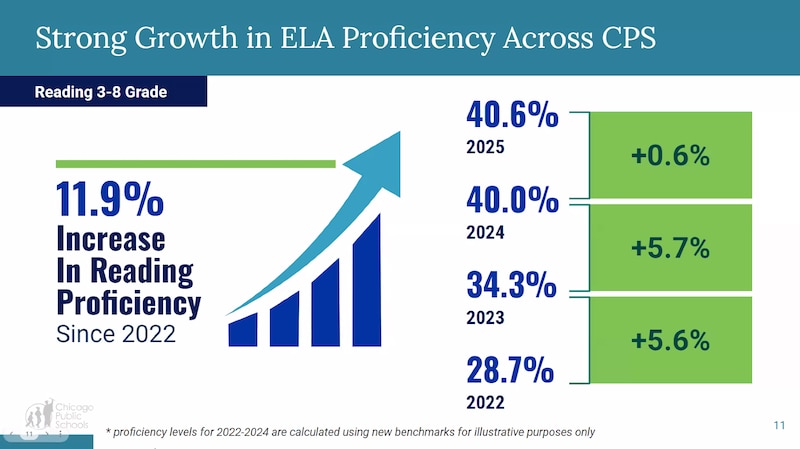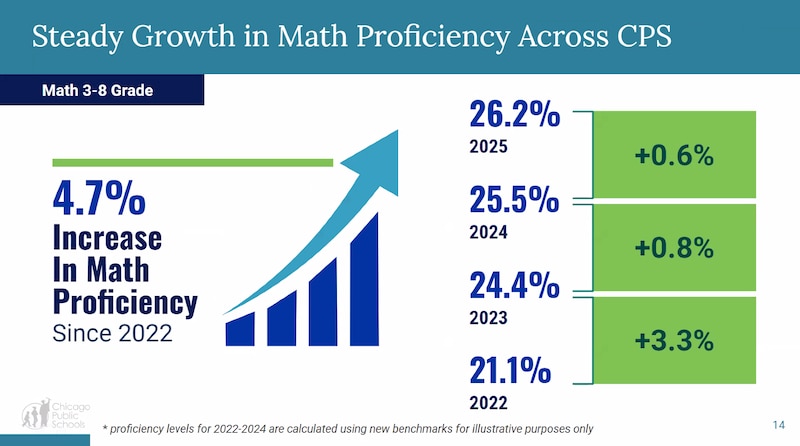Sign up for Chalkbeat Chicago’s free daily newsletter to keep up with the latest news on Chicago Public Schools.
On the first standardized test results reported since Illinois changed the scores needed to be deemed proficient, 52% of students met the bar in English and 38% did so in math.
State officials unveiled the new cut scores in August after gathering input from teachers, school leaders, and advocates. They then applied the new benchmarks to tests students took this past spring.
But in releasing a trove of data known as the state report card, the Illinois State Board of Education did not provide data allowing the public to compare proficiency rates from previous years when the cut scores were different.
State Superintendent Tony Sanders insisted the proficiency rates would’ve increased this year even without the change.
“They would have increased if we had kept the same cut scores, however, we changed the cut scores, so we can’t tell you what they would have been, but we know they would have improved,” Sanders said.
In 2024, under the old cut scores, 39.4% of students tested proficient in English and 27.9% in math. Proficiency rates had been inching back upward since dropping in 2021 after COVID closed schools and sent learning online.
Robin Steans, president of the education policy organization Advance Illinois, said changing the cut scores alone is not the problem.
“The state probably needed to look at its cut scores, and we expected some of the changes that we saw,” Steans said. “What’s challenging is that without seeing the cut scores applied side by side, and without yet having access to scale scores, it’s very difficult to know what amount of this growth is real growth year over year.”
Officials with Chicago Public Schools, however, did provide their own analysis in an attempt to give an apples-to-apples comparison. They shared what student proficiency rates would have been the past three years by applying the new cut scores to past data.
Under the new cut scores, 40.6% of CPS students who took the Illinois Assessment of Readiness in the spring of 2025 are considered proficient in English language arts while 26.2% were in math.


Under the old cut scores, roughly 31% of third through eighth graders in CPS who took the IAR in spring 2024 were deemed proficient in English language arts, while 18% were considered proficient in math.
Illinois education officials have argued that the state’s old proficiency benchmarks were among the highest in the nation and confused parents because they were not aligned with grade level standards and expectations.
Still, the changes are coming five years after the COVID pandemic left a generation of kids with learning gaps that have continued to show up across a variety of traditional metrics for measuring student academic achievement.
“I don’t think we can say that they’ve recovered,” said Jessica Handy, executive director with Stand for Children. “I also think that it will be harder to tell what recovery looks like when we’ve changed the bar.”
Handy is part of a coalition of parents who have been advocating for stronger reading instruction across the state. Many parents in that coalition are “fuming mad” that their kid can’t read and instead of schools doing the hard work to get kids to be proficient under the old cut scores, there’s instead “been a change in the goal posts,” she said.
She’s also concerned about the state changing cut scores at the same time the U.S. Department of Education has cut a lot of staff tasked with collecting and reporting data.
“This is somewhat unfortunate timing to have the change in cut scores because I also feel like we have less confidence that we’re going to have good data federally,” Handy said. “And I think it would be really great if we could preserve some of that at the state level.”
Becky Vevea is the bureau chief for Chalkbeat Chicago. Contact Becky at bvevea@chalkbeat.org.





